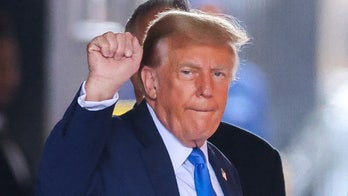GOP Sen. Ron Johnson on Sunday defended Americans’ rights to own guns following the Colorado massacre and calls for tougher weapons laws, saying the real issues are “sick, demented individuals” and how the country deals with them.
“This isn’t an issue about guns,” Johnson, R-Wis., said on "Fox News Sunday." “This is really an issue about sick, demented individuals. It's a tragedy, and I don't think there’s a solution in Washington to solve that problem. ... other than look to our families, look to our communities, starting with our education system. We've got to re-instill values in what we're teaching our children. We need to look at families and the education system.”
He also pointedly called the alleged Colorado shooter, James Holmes, "a sick, demented, evil individual."
Johnson faced off on the gun-control issue with Democratic Sen. Dianne Feinstein, following the mass shooting early Friday in Colorado in which a gunman allegedly used an AR-15 rifle with a large magazine to kill 12 people and injure dozens of others in a movie theater.
Feinstein, D-Calif., argued the federal government should put a ban on rapid-fire weapons and large magazines, which can hold as many as 100 rounds.
“Weapons of war don’t belong on the streets,” Feinstein said on the show. “We’ve got to sit down and really come to grips on what is sold to average citizens.”
Feinstein -- whose legislation banning assault weapons for 10 years expired in 2004 -- said she has no problem with somebody owning a registered gun and that gun-rights groups have become so powerful that lawmakers are reluctant to push and vote for more gun control for fear of political backlash.
Still, Colorado Gov. John Hickenlooper, also a Democrat, suggested tighter regulations likely would not have prevented Holmes.
"If it wasn't one weapon, it would have been another. I mean, he was diabolical," he said on CNN's "State of the Union." "If there were no assault weapons available, and no this or no that, this guy is going to find something, right? He's going to know how to create a bomb."
The call for federal lawmakers to tighten gun laws began shortly after the shooting, including one from New York Mayor Michael Bloomberg, an independent.
"Soothing words are nice," he said in a radio interview, "but maybe it's time that the two people who want to be president of the United States stand up and tell us what they are going to do about it, because this is obviously a problem across the country."
New Jersey Democratic Sen. Frank R. Lautenberg over the weekend urged Congress to swiftly address a ban on certain weapons.
“Let's stop wasting time and start saving lives,” Lautenberg, D-N.J. said on his Twitter account. “Congress must prioritize a ban on high-capacity gun magazines.”
A Lautenberg told the Huffington Post: “If reports are correct and a high-capacity gun magazine was used to commit these awful murders, Senator Lautenberg will absolutely renew his effort to limit the availability of this dangerous firearm attachment."
Last year, Lautenberg introduced legislation to ban high-capacity ammunition magazines. He also has authored other gun-related bills including one that would close so-called loopholes on background checks for buyers at gun shows.
Once, every highly publicized outbreak of gun violence produced strong calls from Democrats and a few Republicans for tougher controls on firearms.
Now those pleas are muted, a political paradox that's grown more pronounced in an era scarred by Columbine, Virginia Tech, the wounding of a congresswoman and now the shooting in a suburban movie theater where carnage is expected on-screen only.
"We don't want sympathy. We want action," Dan Gross, president of the Brady campaign said Friday as Obama and Romney mourned the dead.
Ed Rendell, the former Democratic governor of Pennsylvania, was more emphatic than many in the early hours after the shooting. "Everyone is scared of the NRA," he said on MSNBC. "Number one, there are some things worth losing for in politics and to be able to prevent carnage like this is worth losing for."
Yet it's been more than a decade since gun control advocates had a realistic hope of getting the type of legislation they seek, despite predictions that each shocking outburst of violence would lead to action.
In 1994, when Congress approved the 10-year ban on 19 types of military-style assault weapons. Some Democrats quickly came to believe the legislation contributed to their loss of the House a few months later.
Five years later, Vice President Al Gore cast a tie-breaking Senate vote on legislation to restrict sales at gun shows.
The two events turned out to be the high-water mark of recent Democratic drives to enact federal legislation aimed at reducing gun violence, and some Republicans said they could see the shift coming.
By 2004, when the assault weapon ban lapsed, congressional Democrats made no serious attempt to pass an extension. President George W. Bush was content to let it fade into history.
Public sentiment had swung.
According to a Gallup poll in 1990, 78 percent of those surveyed said laws covering the sale of firearms should be stricter, while 19 percent said they should remain the same or be loosened.
By the fall of 2004 support for tougher laws had dropped to 54 percent. In last year's sounding, 43 percent said they should be stricter, and 55 percent said they should stay the same or be made more lenient.
The issue often divides rural voters from urban voters, which can also mean Republicans on one side and Democrats on the other.
In the current election cycle, the National Rifle Association has made 88 percent of its political donations to Republicans, and 12 percent to Democrats, according to OpenSecrets.org. The disparity obscures that the organization consistently supports some Democrats, a strategy that allows it to retain influence in both parties.
It also reported spending $2.9 million on lobbying last year.
Its clout was vividly on display in 2010 when majority Democrats in the House sidetracked legislation giving the District of Columbia a voting representative in the House. Republicans had vowed to add an NRA-backed provision invalidating a city ban on handgun possession as the price for passage, and there was little doubt it had the votes to prevail.
Obama won the White House despite strong opposition from the NRA.
As a senator from Illinois and state lawmaker before that, he was a strong supporter of gun control.
Following last year's killing of six people and the wounding of Rep. Gabrielle Giffords in Tucson, Ariz., Obama called for steps to "keep those irresponsible, law-breaking few from getting their hands on a gun in the first place."
He advanced no legislative proposals then, and on Friday, spokesman Jay Carney said, "The president believes that we need to take common-sense measures that protect Second Amendment rights of Americans, while ensuring that those who should not have guns under existing law do not get them."
Obama isn't the only 2012 White House candidate to adjust his views on gun control.
In a losing Senate campaign in Massachusetts in 1994, Romney said, "I don't line up with the NRA." A decade later, as governor, he signed legislation making a state assault weapons ban permanent.
This year, bidding for support at the NRA convention, he said: "We need a president who will enforce current laws, not create new ones that only serve to burden lawful gun owners."
The Associated Press contributed to this report.





